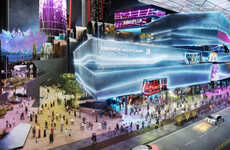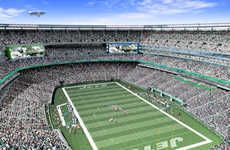
2010 World Cup England Team to Stay at $19.5 Million Facility
Katherinev123 — September 22, 2009 — Luxury
References: dailymail & luxury-insider
A secluded luxury complex in South Africa will be home and training facility to the 2010 World Cup England team when they travel to South Africa for the premier international football tournament.
The 2010 World Cup England team is made up of some of the world’s highest paid footballers—so of course, they would expect no less than a £12,000,000 complex (rougly $19,500,000). The property, known as the Royal Bafokeng Sports Campus, sprawls 133 acres and includes private balconies, swimming pools (three, to be exact), jacuzzis, lounges, gyms, an athletic track, and four grass and four artificial football turfs.
There is even a 26-acre private safari for the players in case they want to wind down from a long day of training by observing and photographing wild animals.
The 2010 World Cup England team is made up of some of the world’s highest paid footballers—so of course, they would expect no less than a £12,000,000 complex (rougly $19,500,000). The property, known as the Royal Bafokeng Sports Campus, sprawls 133 acres and includes private balconies, swimming pools (three, to be exact), jacuzzis, lounges, gyms, an athletic track, and four grass and four artificial football turfs.
There is even a 26-acre private safari for the players in case they want to wind down from a long day of training by observing and photographing wild animals.
Trend Themes
1. Luxury Sports Complexes - There is an opportunity for companies to create more luxury sports complexes by offering high-end amenities, private pools, and large properties for athletes and teams to stay and train in.
2. Personalized Training Facilities - There is an opportunity for companies to create personalized training facilities for professional athletes and teams, where they can have access to customized equipment for their specific needs and preferences.
3. Eco-friendly and Sustainable Sports Complexes - There is an opportunity for companies to create eco-friendly and sustainable sports complexes that minimize their impact on the environment, by using renewable energy sources, recycling water, and reducing waste.
Industry Implications
1. Hospitality Industry - The hospitality industry can capitalize on the trend of luxury sports complexes by providing high-end accommodations, personalized services, and exclusive amenities to professional athletes and teams.
2. Sports Equipment Industry - The sports equipment industry can capitalize on the trend of personalized training facilities by providing customized equipment, gear, and supplies for professional athletes and teams.
3. Environmental Industry - The environmental industry can capitalize on the trend of eco-friendly and sustainable sports complexes by providing green technologies, renewable energy solutions, and waste reduction strategies for sports facilities and events.
2.8
Score
Popularity
Activity
Freshness























